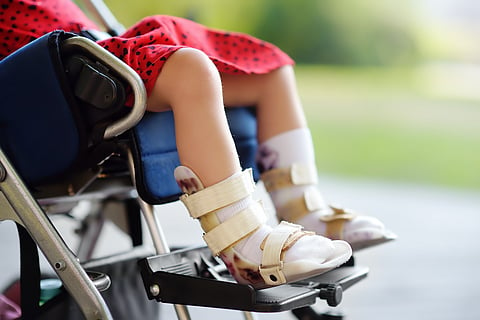

By Dr Jayanth S Sampath
Cerebral palsy (CP) is a group of conditions that affect a person’s ability to move and maintain posture and balance. It is the most common form of movement disability in children. CP can occur due to genetic causes or due to damage to the brain in the first two years of life. Premature babies with low birth weight, brain infections (meningoencephalitis), lack of oxygen to the brain during childbirth, and untreated jaundice in the newborn period and near-drowning are other common causes of CP. In addition to walking difficulties, children with CP frequently have speech delay, seizures (epilepsy), swallowing problems, visual impairment and difficulty in learning.
The management of cerebral palsy is best undertaken by a multi-disciplinary team of professionals. This improves the quality of decision-making, and reduces the overall cost and effort of providing care to the child and family. Specialists from a variety of fields have to work closely to provide optimum care to a child with CP.
An accurate diagnosis of CP is important and should be done by a paediatric neurologist. The most common treatment for CP is physiotherapy, which helps the child achieve their milestones, prevents complications such as contractures and deformity in later life. Splints (braces or special shoes) are used to support the legs when the child is learning to walk. Control of seizures and muscle tightness (spasticity) is achieved mainly through medication. In some situations, medicines are injected into tight muscle groups to relieve spasticity and casts applied to stretch the muscle gently.
Many children with CP will benefit from an intervention called Gait Improvement Surgery, typically after the age of 7, once natural brain maturation has been completed. Children with CP can also develop deformities of the feet and legs, dislocation of the hip joint, scoliosis (curvature of the spine) and difficulty in hand function. Therefore, regular follow-up with a paediatric orthopaedic surgeon is important for the early identification of these issues and appropriate management. We aim to complete any corrective surgery before the age of 12 so that the child’s education is not disrupted during the secondary school years.
Pragati, our state-of-the-art facility located at Rainbow Children’s Hospital, Marathahalli, Bengaluru, provides all the services required for children with cerebral palsy, autism and disabilities under one roof. This includes multi-dimensional physiotherapy such as gross motor, fine motor and virtual reality rehabilitation, occupational therapy, Sensory Integration (SI), speech therapy and paediatric psychology services in an integrated manner.
Our therapy centre is supported by an experienced team of specialists in the field of Paediatric Orthopaedics, Paediatric Neurology, Clinical Genetics and Child development. We have an orthotics workshop that fabricates custom-made splints and braces.
Walking problems in CP are complex and it can be difficult to decide the correct surgical plan. For such cases, we use the 3D Gait Analysis Lab that provides accurate information about the child’s walking pattern at every level from the trunk to the foot. The motion capture equipment in the gait lab is similar to the technology used by Hollywood for CGI and special effects. This data improves the decision-making regarding surgery and eventual surgical outcomes are much better when 3D gait analysis is used as part of the assessment process.
The government has a medical insurance plan called the Niramaya scheme under The National Trust for children with cerebral palsy, autism and multiple disabilities, which provides reimbursement of health-related expenses to the family of up to Rs 1 lakh per year. We also encourage parents to obtain a disability certificate from the state government as this will assist the family to obtain various concessions and access to government schemes meant for persons with disability.
Children with cerebral palsy can expect to lead a fairly normal life as fully functioning members of society. Providing the correct treatment at the right time during the childhood years is essential for a successful result.
This article was published in association with Rainbow Children's Hospital.